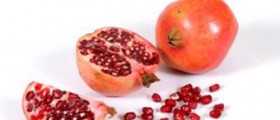
The pomegranate fruit originates from Iran to the Himalayas in northern India. It is cultivated in the Mediterranean countries for centuries. Pomegranate fruits grow on a small rounded shrub of 12 to 16 ft in height. Fruits are round and 2-1/2 to 5 in. wide in diameter. It has leathery skin that is usually yellow with pink and red patches. Inside of the leather is a spongy bitter tissue that separates compartments packed with sacs filled with juicy nectar. Every sack contains one angular seed.
Pomegranate health benefits
Pomegranate may be used fresh or in the form of fruit juice. There are many significant health benefits associated with pomegranates. Some studies report the ability to destroy breast cancer cells, while leaving the healthy cells intact. Moreover, pomegranate may prevent the possible future formation of cancerous tissue. Some studies conducted on mice, show that pomegranate juice inhibits the growth of lung cancer and slows the growth of prostate cancer. They study about pomegranate benefits, conducted on pregnant women, reports its rare ability to protect the neonatal brain from damage after injury.
Other significant health protective features include prevention of osteoarthritis, prevention and reversal of arterial plaque buildup and prevention of Alzheimer’s disease.
Pomegranate affects cholesterol levels positively, by lowering bad cholesterol and raising the levels of good cholesterol. It also lowers the systolic blood pressure. Other benefits include the ability to bring the relief from morning sickness, to promote healthy appetite, and cure the sore throat.
Nutritional value of pomegranates
Pomegranates are beneficial to health due to their high nutritional value. Pomegranates are very low in saturated fat; they contain no cholesterol and just a low amount of sodium. Pomegranate fruits are also high in potassium and vitamin C. The only bad point about pomegranates is that they contain high levels of sugar. Total carbohydrate count in one pomegranate serving of 154 grams (3-3/8” in diameter) is approximately 26.4 grams. That is enough to satisfy 9% of recommended daily value of carbohydrates. Dietary fiber is contained in an amount of 0.9 grams (enough to satisfy 4% of daily value) and the rest of it, as much as 25.5 grams is sugars.
One pomegranate serving contains 0.5g of fat. Most of the fat is composed from saturated fat (0.1g) polyunsaturated fat (0.1g) and monounsaturated fat (0.1g). There are approximately 5mg of sodium in 1 serving and 1.5g of protein. It satisfies 3% of recommended daily value of Vitamin A, 16% of recommended daily amount of Vitamin C and 3% of recommended daily value of Iron.One serving has 150 calories and 4 calories from fat.

















Your thoughts on this
Loading...